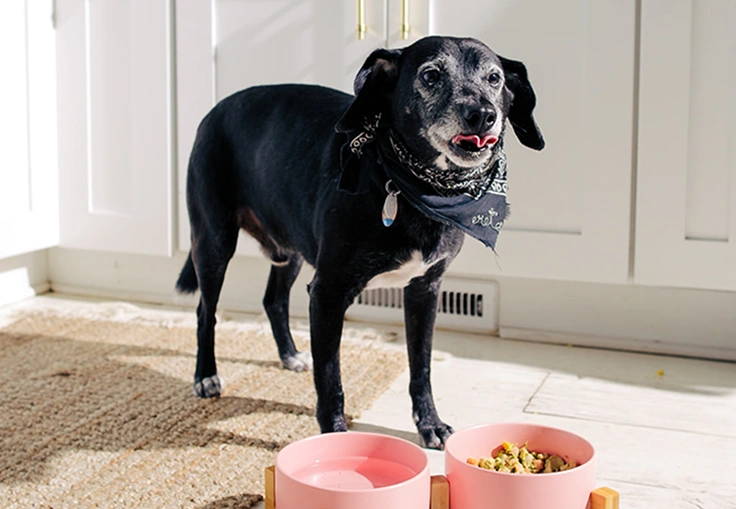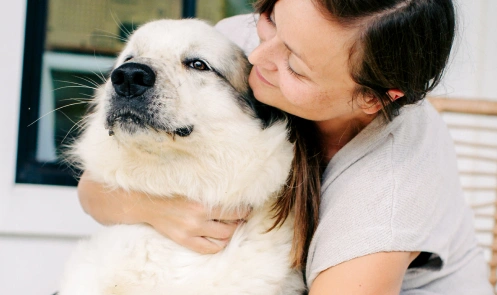Gut bacteria play a big role in keeping their host healthy. Without them, animals would not be able to digest important nutrients or fight off intestinal pathogens. But scientists are also discovering that these microbes play a key role in another big important issue: cancer.
Cancer, unfortunately, is universal. Most people have been impacted in some way by the disease. Despite recent advances in treatment, such as immunotherapy and precision medicine1, 9 million people a year2 die because of cancer.
Sadly, this does not only apply to our human friends—our pets are affected, too. Cancer is the leading cause of death in older dogs3 and it also affects cats4, albeit less often. According to the American Veterinary Medical Association, almost half of dogs over the age of 10 will develop cancer at some point in their lives5. Available treatment options for pets are similar to ours: chemotherapy, radiation and surgery, or various combinations. A research team at Yale is even testing a vaccine to combat devastating canine cancers such as colon cancer6. Clinical trials for other vaccines, as well as immunotherapy, for osteosarcoma and melanoma in dogs are also ongoing.
Despite the deluge of cancer studies, there are many questions that remain unanswered. Recent research has shown that not only cancer risk but also the success of treatment can be affected by the bacteria that inhabit your pet’s intestines.
The Microbiome as a Risk Factor for Cancer
There are a wide variety of factors that impact cancer risk. Smoking, viral infections, and exposure to certain chemicals are just some of the many aspects of life that can increase the chances of developing cancer. Chronic inflammation of the gut is another7.
Singular species of bacteria on their own can be tied to cancer. For example, Helicobacter pylori is linked to stomach cancer in humans,8 but the interactions between bacterial species can also have an effect. While the gut microbiota typically keep their host healthy, the population may become imbalanced, a condition called dysbiosis. Dysbiosis often causes inflammation of the gastrointestinal lining, which can become a long-term problem and may lead to the development of cancer9.
Studies in humans and mice have shown a relationship between microbiome composition and certain types of cancer10. For example, one study showed that colon cancer tumors have the same microbiome as any metastases11. Giving antibiotics to mice with the same microbiome slowed down tumor growth. Another study showed similar results, suggesting that changing the tumor’s microbiome can impact how the disease progresses11.
Research in pets is beginning to find similar links. Dogs with intestinal lymphoma are shown to have different microbiomes than their healthy counterparts13, and even than dogs with intestinal bowel disease14. In one study, dogs with lymphoma had lower levels of Fusobacterium, Faeccalibacterium, and Turicibacter species13. Similar findings have been seen in cats with small cell lymphoma in the gut15. Although, in this case, Fusobacterium levels were higher rather than lower in these cats than others with inflammatory bowel disease, which could reflect differences between species or in how the studies were done.
Colon cancer has also been linked to microbiome changes in dogs. Studies in miniature dachshunds16 and other dogs17 have found distinct gut microbiome compositions in sick or at-risk dogs compared to healthy ones. Other types of cancer could also be associated with such changes but have not yet been explored.
So, pets with cancer tend to have different microbiomes than healthy ones, but are the changes in the microbiome a reflection of the fact that these animals have cancer? Or are these differences responsible for cancer development in the first place? These are questions that researchers are still working on, but it seems that the bacteria living in your pet’s gut have a hand in their cancer risk.
The Microbiome and Cancer Therapy
Cancer therapies have changed drastically over time. As scientists have learned more about immune responses, they have harnessed this power to develop therapeutics to join chemotherapy and radiation in the fight against cancer. Unfortunately, these therapies aren’t always effective, and part of that might stem from the microbiome18.
What we know about the impact gut bacteria have on cancer therapies comes from mouse models, with a few recent studies in humans. For instance, some bacteria seem to aid chemotherapy, such as Lactobacilli19, while others may have negative effects, such as Fusobacterium20. One study showed that Fusobacterium nucleatum decreased the killing of cells during cancer treatment20. The effects of the microbiome on radiation have not been as well studied, but some small studies suggest that toxicity from this type of treatment can be predicted based on the patient’s microbiome18.
But what about immunotherapy—when doctors train the immune system to fight cancer? Gut bacteria and the immune system are tightly linked, and current data indicates that immunotherapy is impacted by microbiome composition21. Studies evaluating patient responses found that specific groups of bacteria could be linked to responsive versus non-responsive patients22-24.
For instance, patients who responded positively to immunotherapy targeting a key pathway that helps kill cells tended to have higher microbiome diversity22-24. Such responders also had higher abundances of bacterial groups such as the Ruminococcaceae family_, Faecalibacterium_ genus22, Bifidobacterium23, and Akkermansia muciniphila_2_4. Non-responders, however, had lower diversity. One study also determined that exposure to antibiotics decreased the likelihood that the patient would respond to the therapy24, suggesting that bacteria play a key role in therapeutic efficacy.
If these microbial impacts on cancer therapies affect our pets in a similar way to humans—which is true for many other aspects of microbiome research—then having a better understanding of what bacteria make up pet microbiomes will be extremely useful. We may even see changes in the standard of cancer care for our companions in the future, based on their microbiome25.
The Future
As scientists learn more about the correlations between cancer and the microbiome, both as a risk and its effects on the effectiveness of cancer therapies, the way that we and our beloved companions receive care could change entirely.
In the future, personalized medicine for cancer could take into account the composition of your gut microbiome. But in order to get there, researchers need to continue building a complete understanding of the relationship between bacteria and cancer.
References
- Types of Cancer Treatment. National Cancer Institute (2017). Available at: https://www.cancer.gov/about-cancer/treatment/types. (Accessed: 18th January 2019)
- Advances in Cancer Treatment. ASCO (2018). Available at: https://www.asco.org/research-progress/reports-studies/clinical-cancer-advances-2018/advances-cancer-treatment. (Accessed: 18th January 2019)
- Study examines causes of death in dogs. Available at: https://www.avma.org/News/JAVMANews/Pages/110615b.aspx. (Accessed: 18th January 2019)
- Davis, J. L. Cancer in Cats: Types, Symptoms, Prevention, and Treatment. WebMD (2009). Available at: https://pets.webmd.com/cats/guide/cancer-in-cats-types-symptoms-prevention-and-treatment. (Accessed: 18th January 2019)
- Cancer in Pets. Available at: https://www.avma.org/public/PetCare/Pages/Cancer-in-Pets.aspx. (Accessed: 18th January 2019)
- Canine cancer vaccine study launched. New Haven Register (2015). Available at: https://www.nhregister.com/connecticut/article/Canine-cancer-vaccine-study-launched-11343473.php. (Accessed: 18th January 2019)
- Rea, D. et al. Microbiota effects on cancer: from risks to therapies. Oncotarget 9, 17915–17927 (2018).
- Ishaq, S. & Nunn, L. Helicobacter pylori and gastric cancer: a state of the art review. Gastroenterol Hepatol Bed Bench 8, S6–S14 (2015).
- Coussens, L. M. & Werb, Z. Inflammation and cancer. Nature 420, 860–867 (2002).
- Sears, C. L. & Garrett, W. S. Microbes, microbiota, and colon cancer. Cell Host Microbe 15, 317–328 (2014).
- Bullman, S. et al. Analysis of Fusobacterium persistence and antibiotic response in colorectal cancer. Science 358, 1443–1448 (2017).
- Zackular, J. P., Baxter, N. T., Chen, G. Y. & Schloss, P. D. Manipulation of the Gut Microbiota Reveals Role in Colon Tumorigenesis. mSphere 1, (2016).
- Gavazza, A. et al. Faecal microbiota in dogs with multicentric lymphoma. Vet. Comp. Oncol. 16, E169–E175 (2018).
- Omori, M. et al. Fecal microbiome in dogs with inflammatory bowel disease and intestinal lymphoma. J. Vet. Med. Sci. 79, 1840–1847 (2017).
- Garraway, K. et al. Relationship of the mucosal microbiota to gastrointestinal inflammation and small cell intestinal lymphoma in cats. J. Vet. Intern. Med. (2018). doi:10.1111/jvim.15291
- Igarashi, H. et al. Fecal dysbiosis in miniature dachshunds with inflammatory colorectal polyps. Res. Vet. Sci. 105, 41–46 (2016).
- Herstad, K. M. V., Moen, A. E. F., Gaby, J. C., Moe, L. & Skancke, E. Characterization of the fecal and mucosa-associated microbiota in dogs with colorectal epithelial tumors. PLoS One 13, e0198342 (2018).
- Alexander, J. L., Kohoutova, D. & Powell, N. Science in Focus: The Microbiome and Cancer Therapy. Clin. Oncol. 31, 1–4 (2019).
- Viaud, S. et al. The intestinal microbiota modulates the anticancer immune effects of cyclophosphamide. Science 342, 971–976 (2013).
- Yu, T. et al. Fusobacterium nucleatum Promotes Chemoresistance to Colorectal Cancer by Modulating Autophagy. Cell 170, 548–563.e16 (2017).
- York, A. Microbiome: Gut microbiota sways response to cancer immunotherapy. Nat. Rev. Microbiol. 16, 121 (2018).
- Gopalakrishnan, V. et al. Gut microbiome modulates response to anti-PD-1 immunotherapy in melanoma patients. Science 359, 97–103 (2018).
- Matson, V. et al. The commensal microbiome is associated with anti-PD-1 efficacy in metastatic melanoma patients. Science 359, 104–108 (2018).
- Routy, B. et al. Gut microbiome influences efficacy of PD-1-based immunotherapy against epithelial tumors. Science 359, 91–97 (2018).
- Cancer Treatment. vca_corporate Available at: https://vcahospitals.com/know-your-pet/cancer-treatment. (Accessed: 18th January 2019)




